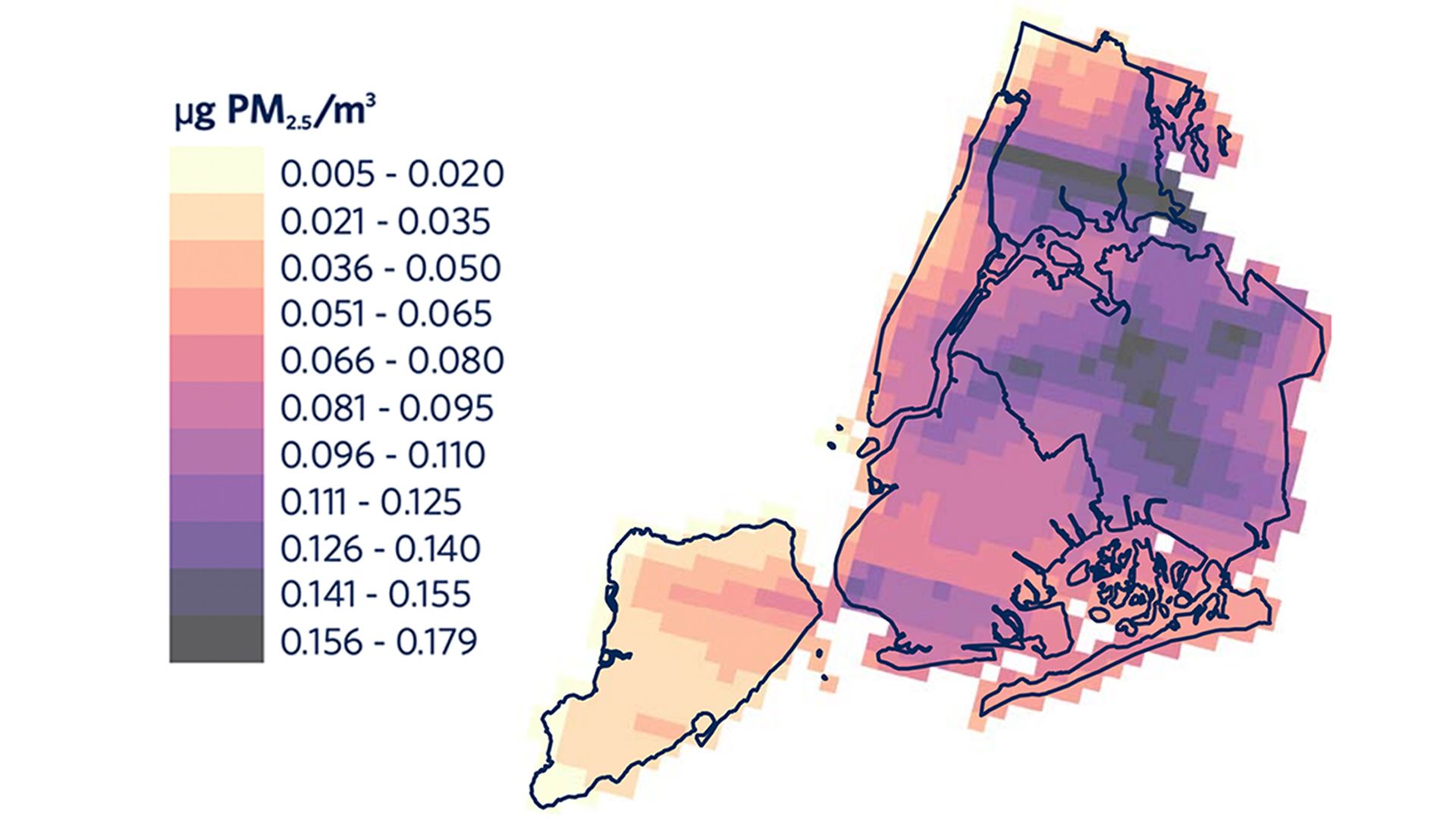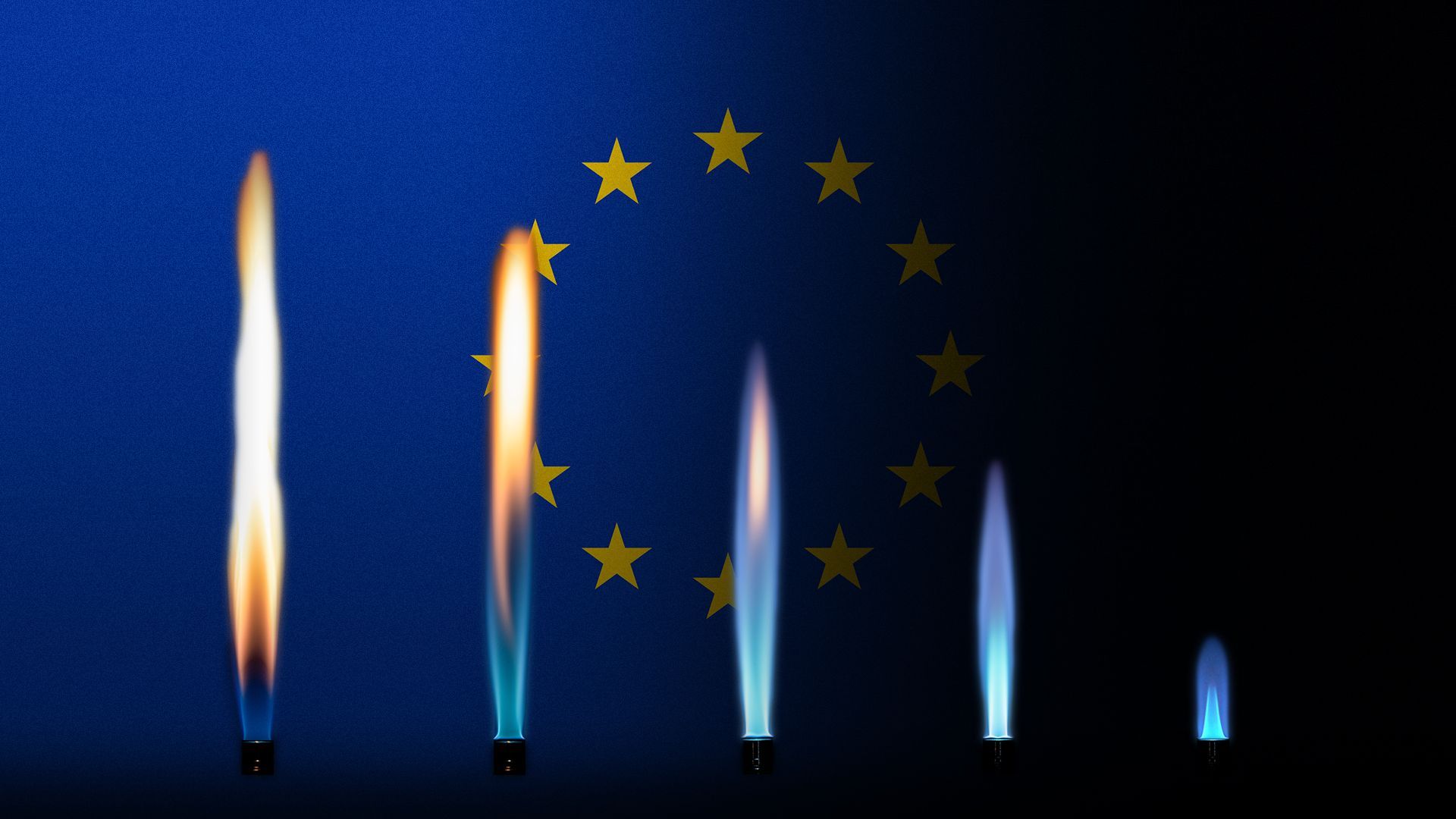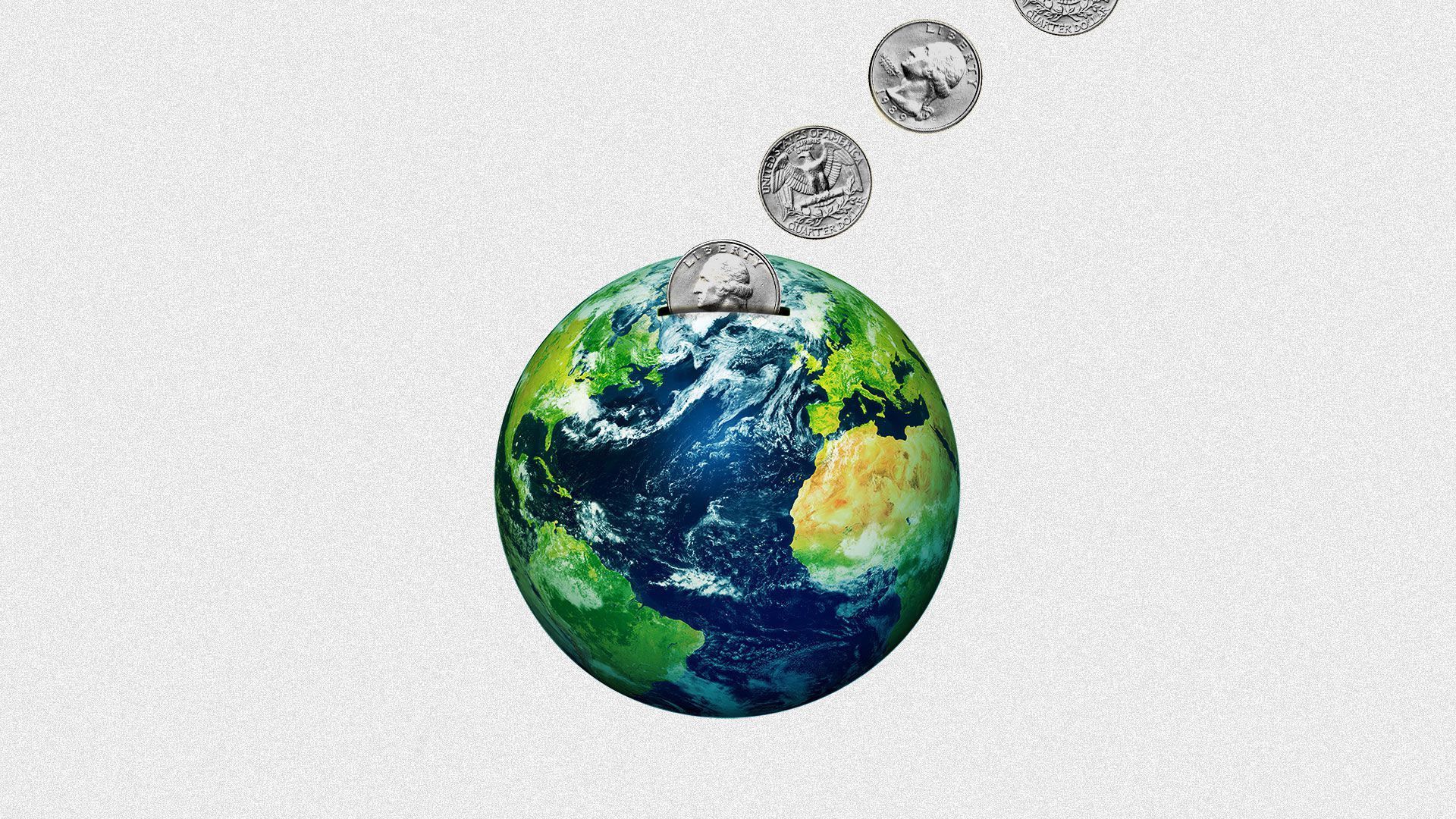| | | | | | | Presented By ENEL NORTH AMERICA | | | | Axios Generate | | By Ben Geman and Andrew Freedman · Apr 14, 2022 | | 👋 Welcome back! Today's Smart Brevity count is 1,228 words, 5 minutes. 🎶 40 years ago the Go-Go's were atop the Billboard album charts with "Beauty and the Beat," which provides today's stellar intro tune... | | | | | | 1 big thing: It's still feasible to hold warming to 2°C |  Data: Zeke Hausfather; Chart: Jacque Schrag/Axios Countries now have better than even odds of limiting global warming to at or below the Paris Agreement's 2°C temperature target, a new study finds, Andrew writes. Yes, but: This can only happen if all national emissions reduction pledges are fully met — and right now that's a big IF. Why it matters: Published in the journal Nature, this is the first peer-reviewed study to show such high odds of holding the global temperature increase to 2°C based on world leaders' existing pledges. The intrigue: The study, led by Malte Meinshausen at the University of Melbourne, finds only a faint chance, between 6% to 10%, of meeting the agreement's more ambitious 1.5°C target. - To do so would require countries to commit to far more stringent emissions cuts prior to 2030, and reach net zero by 2050.
Threat level: While a world that is 2-degrees warmer, on average, than preindustrial levels is far better than the 4°C to 6°C of warming that researchers once projected, it would still be a dystopian future. - According to a 2018 study, warming beyond 1.5 degrees carries higher risks of calamitous consequences, including the death of warm-water coral reefs, irreversible melting of large portions of polar ice sheets, and rising sea levels.
- With just 1.1°C of warming so far, compared to preindustrial levels, we're seeing unprecedented heat waves, wildfires, intensifying tropical cyclones, and melting glaciers and ice caps.
Details: The study looks at the evolution in country emissions pledges, known as "Nationally Determined Contributions" (NDCs), between the Paris summit in 2015 and the summit in Glasgow late last year. - "This is big news because it's the first time that governments have come forward with specific targets that can hold global warming to below the symbolic 2 degrees level," study co-author Christophe McGlade of the International Energy Agency told reporters.
How it works: The study examines over 1,400 emissions scenarios from 154 commitments made up to and during the Glasgow summit. But, but, but... Policies are still needed to implement those pledges, and so far they're in short supply. In fact, the global energy crunch due to the war in Ukraine may be pushing energy policies in the direction of more fossil fuel extraction for some countries, including the U.S. Read more. |     | | | | | | 2. New York's diesel truck pollution disparities |  | | | PM 2.5 concentrations from diesel truck emissions in New York City. Courtesy of TRUE | | | | New analysis finds big racial differences in exposure to air pollution from diesel trucks in New York City, Ben writes. Why it matters: The findings underscore the wider need to confront higher pollution burdens that low-income and communities of color often face. Driving the news: New Yorkers of color are exposed to 17% more fine particulate matter than white residents, per The Real Urban Emissions Initiative. - TRUE is a partnership between the FIA Foundation and the International Council on Clean Transportation.
Threat level: Particulate pollution is very dangerous. It's linked to irregular heartbeat, worsening asthma, and other heart and respiratory threats. Zoom in: Engines that predate tougher federal emissions controls are a major culprit. Pre-2007 trucks are 6%–10% of the area's fleet, but contribute 64%–83% (!) of fine particulate emissions from diesel tailpipes. What's next: Recommendations include additional funding for the city's "clean trucks" program to replace older vehicles, and better inspections to find high emitters among newer trucks. Read the report. |     | | | | | | 3. First look: Science group activates to tackle wildfires |  | | | Illustration: Annelise Capossela/Axios | | | | A new group of more than 1,000 rapid response scientists from multiple disciplines — the International Science Reserves — announced its official activation on Wednesday, which it shared first with Axios, Andrew writes. - In addition, wildfires are the first challenge ISR members are set to tackle.
Why it matters: This is the first test of the new scientific organization that formed last summer through a collaboration between IBM and the New York Academy of Sciences, along with other resources. - It is modeled in part on a high-performance computing program that aided researchers in combating the COVID-19 pandemic.
How it works: The ISR has conducted readiness exercises among its members to determine how they might conduct work if and when disaster strikes, including wildfire scenarios in the Pacific Northwest and Indonesia. What they're saying: "Although wildfires have been ravaging countries around the world for the last decade, many have seen their worst blazes in generations," said Nicholas B. Dirks, president and CEO of NYAS, in a statement to Axios. "Our approach is multidisciplinary and takes a holistic view of the impacts of wildfires," he said. Go deeper: Guarding against the next pandemic with a LinkedIn for science |     | | | | | | A message from ENEL NORTH AMERICA | | Why you need to electrify your operations now | | |  | | | | A clean, electrified energy future will transform our economy: - Technologies will run on electricity, replacing those reliant on fossil fuels.
- Businesses will transition from consumers to prosumers in the new energy economy.
Are your operations ready? Take the Clean Electrification Quiz. | | | | | | 4. Europe's Russian energy conundrum |  | | | Illustration: Annelise Capossela/Axios | | | | A few items crossed my screen that explore the difficulty of translating Europe's ambition to abandon Russian fossil fuels into tangible action, but also the energy security risks that reliance brings, Ben writes. The big picture: Moody's Investors Service, in a new report, said a full Russian cut-off of supplies to Europe isn't their "baseline assumption." - But "an alternative downside scenario that would likely entail energy rationing in countries with significant reliance on Russian gas."
- "This, in turn, would likely trigger an economic recession in Europe and raise the risk of a global recession."
Meanwhile, the Financial Times explores joint findings from several German economic institutes. They conclude a full EU embargo would shed 400,000 jobs in Germany and spur recession. What they're saying: "Going cold turkey on fossil fuels from Russia would cause a massive, instant disruption," Emily Haber, Germany's ambassador to the U.S., said in a Twitter thread yesterday. "You cannot turn modern industrial plants on and off like a light switch. The knock-on effects would be felt beyond Germany, the EU's economic engine and 4th largest economy in the world," she said. |     | | | | | | 5. A lot more U.S. crude is coming — eventually |  Data: Rystad Energy; Chart: Thomas Oide/Axios Growth in drilling permits for new wells in the most prolific U.S. oilfield could signal a coming production surge, the consultancy Rystad Energy said, Ben writes. Why it matters: Producers face calls to accelerate growth as some buyers shun Russian crude and U.S. gas prices average over $4-per-gallon. Driving the news: Permits approvals in the Permian Basin for horizontal drilling — which is key to unlocking shale oil — grew to 904 in March. It's a record high for the region in West Texas and New Mexico, "driven by elevated oil prices and production demand," Rystad said. Yes, but: Don't expect an immediate production spike. Keep reading. |     | | | | | | 6. BlackRock sees climate-friendly asset growth |  | | | Illustration: Aïda Amer/Axios | | | | BlackRock predicts a steep increase in investments tied to Paris Agreement-friendly assets by 2030, Ben writes. Driving the news: "[W]e anticipate that by 2030, at least 75% of BlackRock corporate and sovereign assets managed on behalf of clients will be invested in issuers with science-based targets or equivalent," the firm said, noting the level is roughly 25% today. Why it matters: BlackRock is the world's largest asset manager, and influences the financial sector's wider climate approach. What they're saying: "[T]his commitment could potentially have significant influence on lowering global emissions," the climate advocacy group BlackRock's Big Problem said. But its statement adds: "The actual impact of the target, however, depends on whether BlackRock implements guidelines to ensure that the heavy emitters in its portfolio are explicitly covered by its goal." Reuters has more. |     | | | | | | Number of the day: 35% | | That's the share of California's new vehicle sales that would come from electric or hydrogen-powered models by 2026 under new draft state regulations, per AP. Why it matters: California is by far the largest U.S. car market, and its plans also influence some other states' policies. The NYT has more. |     | | | | | | A message from ENEL NORTH AMERICA | | What the electrified economy means for you | | |  | | | | By 2032, clean energy will be essential. Why it's important: As energy transitions to 100% clean electricity, energy users that go all-in on electricity can meet emissions targets, cut costs and climate-proof their operations. See how to prepare for an electric future. | | | | Thanks for reading. Please tell your friends and colleagues to sign up for Generate and Axios' other free national and local newsletters. |  | It's called Smart Brevity®. Over 200 orgs use it — in a tool called Axios HQ — to drive productivity with clearer workplace communications. | | | | | | Axios thanks our partners for supporting our newsletters. If you're interested in advertising, learn more here.
Sponsorship has no influence on editorial content. Axios, 3100 Clarendon Blvd, Suite 1300, Arlington VA 22201 | | | You received this email because you signed up for newsletters from Axios.
Change your preferences or unsubscribe here. | | | Was this email forwarded to you?
Sign up now to get Axios in your inbox. | | | | Follow Axios on social media:    | | | | | |











No comments:
Post a Comment